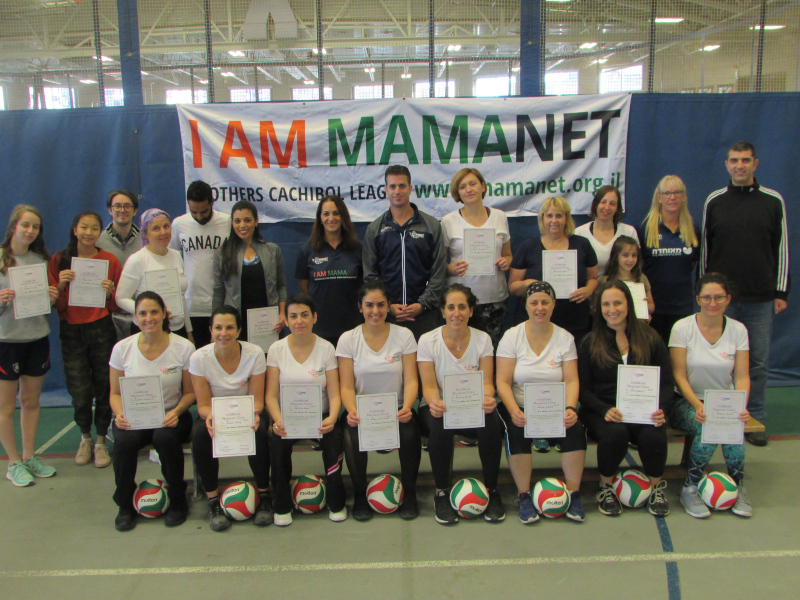A sport that almost no one in Canada has heard about has become something of a craze among women in Israel, with thousands it playing socially every week.
Mamanet is the largest women’s cachibol league, with more than 16,000 players, all mothers over 30 years of age. In recent years, it has been spreading that enthusiasm abroad and now has a toehold in Canada.
Ofra Abramovich, who founded Mamanet in 2005, was in Montreal, along with two of her staff, to lead a three-day clinic, held at McGill University’s Tomlinson Fieldhouse sports complex, with the support of the Israeli Consulate.
It was an opportunity for prospective players to try out the game, and to train coaches, referees and scorekeepers.
READ: ISRAELI SPORTS LEAGUE FOR MOMS HOLDS CLINIC IN MONTREAL
Despite limited publicity, many came and had a good time.
Abramovich’s goal is to attract enough women to create a permanent competitive league in Montreal. Mamanet is open to any mom who meets the minimum age, regardless of athletic ability, physical appearance, religion or socioeconomic status.
In Israel, Mamanet teams can be found in Orthodox communities, Arab villages and even inside prisons, she said.
Mamanet now has a presence in 15 countries, many with little or no Jewish population, including numerous cities in the United States.

Abramovich said, jokingly, that, “This is the first time Israel has exported a startup that is not in technology.”
Cachibol, also called newcomb, is a gentler variation of volleyball. It’s actually an old game that was invented in 1895 by a female physical education teacher at Newcomb College in New Orleans, but its popularity waned in North America.
In cachibol, the padded red, white and green ball is caught and thrown across the net. Unlike volleyball, there is no bumping (passing with the forearms), setting (using fingers only) or spiking (smashing the ball).
Play is expected to not be unnecessarily aggressive and, instead of penalties, there is “positive reinforcement” for good behaviour.
This is the first time Israel has exported a startup that is not in technology.
– Ofra Abramovich
Abramovich was a busy mother of two living in Kfar Saba, Israel, when she finally relented and tried the game, at a friend’s insistence. She felt she had no time and had not played sports since she her youth, but once she got into it, she was hooked.
“I felt like I was 16 again,” she said.
Mamanet is about more than winning, or even fitness, although they are important. Abramovich calls it a “social movement. Wherever they live, mothers have the same needs.”
First of all, the game gives mothers time for themselves and a sense of their own worth as active, engaged people, she said. “Usually, it is the mothers who are driving the kids to their sports programs and cheering them on in the stands. In Mamanet, it is the kids and husbands who come to the games and cheer for them. They are the stars.”

Sport for women over 30 is a low priority for governments, compared to programs for youth and for men, she said. Building Mamanet into a national phenomenon was not easy, in fact, “It was a big fight,” she said.
There is a ripple effect in the family, she added. “If children see their mother doing sports, they are more likely to put down their screens and be active themselves.”
Maya Levy, a mother of four who arrived in Montreal in February with her husband David Levy, the Israeli consul general, is an avid player. He is behind the effort to spread the word.
Mamanet already existed as an informal recreational program at the Sylvan Adams YM-YWHA.
Wherever they live, mothers have the same needs.
– Ofra Abramovich
Carly Berlin, the YM-YWHA’s director of youth and family engagement, said about 25 women were playing last winter, a number that grew to close to 40 by the spring.
They are a diverse group, she noted. “You could hear four or five languages spoken.”
The common thread is that “they love doing something for themselves. Some came in on Mother’s Day, saying it was their gift to themselves,” she said.
“Now we hope to take it to the next level. But that will require women taking ownership, recruiting people and creating their own teams.”
Businesswoman Michelle Morin is confident that can happen. A top athlete in her youth who played on the national field hockey team and has been a soccer coach for many years, she has stepped in to help Mamanet get established in Quebec.
There is a big, big potential.
– Michelle Morin
“There is a big, big potential,” she said. “There are a lot of women who cannot commit to practices and games several times a week, but once a week they can manage.”
A former Mamanet player in Israel who recently moved to Toronto is trying to get a league going there, too. So Abramovich is already dreaming of the day a Canada-wide, if not North America-wide, catchibol tournament can be staged.
